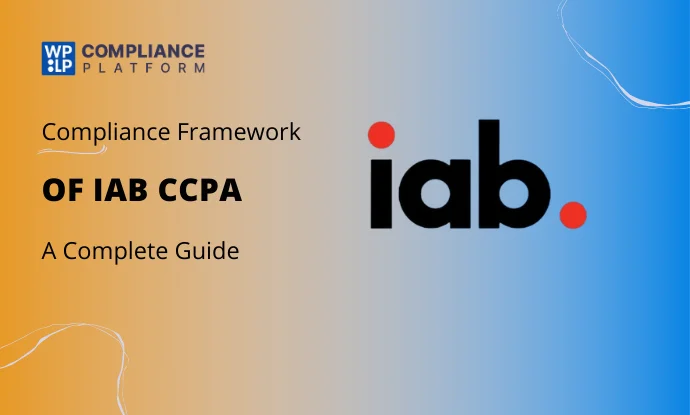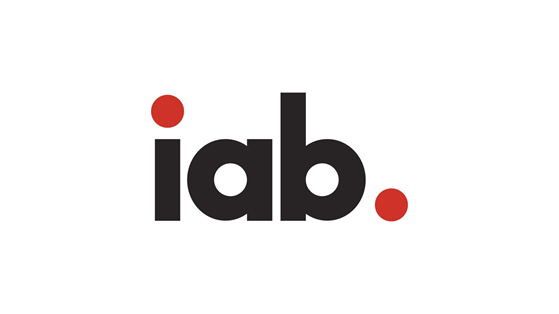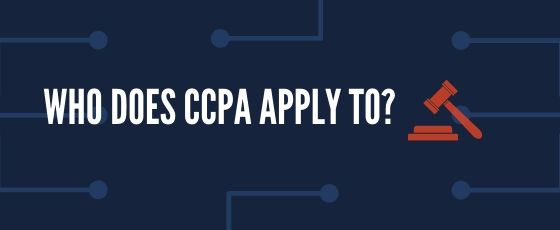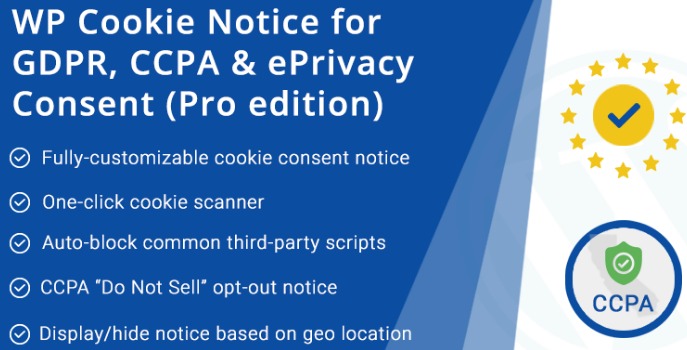IAB CCPA Compliance Framework: Everything You Need To Know

The California Consumer Privacy Act (CCPA) came into force on January 1, 2020. This prompted all the businesses to revamp their procedures for the collection and sale of personal information. Compliance with this strict privacy law necessitates the adoption of new protocols.
In this context, the WP Cookie Consent plugin takes a proactive approach by default, supporting the Interactive Advertising Bureau’s (IAB) CCPA Framework.
This blog post will closely examine the workings of the Framework, demonstrating how WP Cookie Consent seamlessly aligns with its principles.
Now, without further ado, let’s dive right in!
- What is IAB?
- Purpose Of IAB
- Who Can Use The IAB CCPA Compliance Framework
- How Does The IAB CCPA Compliance Framework Work?
- What is CCPA?
- To Whom Does CCPA Apply?
- Consequences of Not Complying With CCPA
- Tips on How To Make Your WordPress Website CCPA Compliant
- WP Cookie Consent Plugin – Make Your WordPress Website CCPA Compliant
- Conclusion
What is IAB?

The Interactive Advertising Bureau (IAB) is a business organization that represents online advertisers, vendors, and tech companies. Its main objective is to develop industry standards for the ad tech sector.
Additionally, IAB provides legal support and conducts research. The IAB CCPA Compliance Framework aims to standardize compliance across the ad tech industry with the California Consumer Privacy Act (CCPA).
It is an agreement between businesses that collect personal information on California residents (e.g., through their websites) and the ad tech companies that buy this information.
Similarly, IAB has an industry framework for compliance with the European General Data Protection Regulation (GDPR).
Purpose Of IAB
The Interactive Advertising Bureau (IAB) serves as a trade association for the digital advertising industry. Its primary purposes include:
- Standardization and Guidelines: The IAB works to develop and promote industry standards and guidelines. This helps ensure consistency within the digital advertising ecosystem. Standardization can cover various aspects, including ad formats, measurement metrics, and privacy practices.
- Education and Research: The IAB educates businesses and professionals on the latest trends, technologies, and best practices in digital advertising through resources and research. This contributes to the overall growth and understanding of the industry.
- Advocacy: The IAB advocates for the digital advertising industry by representing its members in discussions with policymakers, regulators, and stakeholders. This includes addressing issues related to privacy, data protection, and advertising regulations.
- Technology Development: The IAB may contribute to the development of technological solutions that enhance the digital advertising ecosystem. This can involve creating tools, frameworks, or protocols to improve the efficiency of digital advertising.
- Networking and Collaboration: The framework helps companies comply with the CCPA, ensuring digital advertising respects user privacy. This collaboration can lead to the sharing of ideas, innovations, and solutions to common challenges.
It aligns with the purpose of standardization and guidelines. The framework aims to assist companies in complying with the California Consumer Privacy Act (CCPA). Ensuring that digital advertising practices respect user privacy and adhere to relevant regulations.
Who Can Use The IAB CCPA Framework
The IAB CCPA Compliance Framework is designed for use by businesses and organizations operating in the digital advertising industry, particularly those that handle consumer data in the context of online advertising.
This framework is relevant for a wide range of entities involved in digital advertising, including:
- Advertisers: Companies that promote their products or services through digital advertising channels can use the IAB CCPA Compliance Framework to ensure that their advertising practices align with the requirements of CCPA.
- Publishers: Entities that own and operate websites, apps, or other digital platforms where advertising is displayed can benefit from the framework. Publishers can use it to implement measures that respect user privacy and comply with CCPA regulations.
- Ad Tech Companies: Companies that provide advertising technology solutions, such as ad networks, data management platforms (DMPs), and demand-side platforms (DSPs), can use the IAB CCPA Compliance Framework to develop tools and processes that comply with CCPA requirements.
- Marketers: Professionals responsible for creating and managing marketing campaigns can leverage the framework to ensure that their strategies align with privacy regulations, promoting transparency and user consent.
- Digital Media Agencies: Agencies that plan and execute digital advertising campaigns on behalf of clients can use the framework to guide their practices. Additionally, they ensure compliance with CCPA regulations.
- Industry Service Providers: Companies that offer services related to digital advertising, including analytics, measurement, and verification services, can use the IAB CCPA Compliance Framework to enhance their offerings in accordance with privacy standards.
It’s important to note that the IAB CCPA Compliance Framework is not exclusive to any particular type or size of business; rather, it is intended to be a resource for the broader digital advertising ecosystem to navigate and comply with the privacy regulations outlined in the CCPA.
How Does The IAB CCPA Compliance Framework Work?
The operational mechanics of the IAB CCPA Compliance Framework can be broken down into three key steps:
Step 1: Transparent Notices and Disclosures
Publishers, including websites and mobile apps, commit to informing Californian consumers about their privacy rights precisely when collecting data. This involves providing clear and accessible notices regarding the types of data being collected, its intended use, and the rights afforded to consumers under the CCPA. Additionally, publishers are obligated to incorporate a Do Not Sell My Personal Information link on their digital platforms.
Step 2: Streamlined Communication with Ad Tech Companies
The framework establishes a standardized method for publishers to communicate with ad tech companies when a California consumer chooses to opt out of third-party data sales. This ensures a consistent and efficient process for conveying user preferences across the digital advertising ecosystem.
Step 3: Adherence Post Consumer Opt-Out
On receiving notification that a Californian resident has opted out of third-party data sales, ad tech companies follow a pre-agreed protocol outlined in the framework. This includes adjusting their operations to respect the consumer’s choice, refraining from further data sales, and maintaining compliance with the CCPA. The framework thus provides a structured and unified approach for tech companies to navigate their operations in alignment with the privacy preferences of Californian users.
It’s important to note that the IAB CCPA Compliance Framework serves as a resource and guide for businesses rather than a set of strict rules.
Companies can use the framework to inform their internal policies, procedures, and technologies, tailoring their approach to their specific business models and practices while ensuring compliance with the CCPA.
What is CCPA?
The California Consumer Policy Act (CCPA) was introduced to provide consumers from California with control over their personal information and more transparency.
CCPA is a law that has created a broad spectrum of privacy and data protection rules that apply to all businesses in one jurisdiction, that is California. It was created in response to changing public perceptions that the users rightly want to have an understanding of how their data is being handled.
Creating a new industry framework to support CCPA compliance among publishers is crucial for any business. Under the CCPA, California residents have the option to actively opt out of the sale of their data to third parties. They also have the right to be notified and to receive equal services and prices.
It is important to carefully consider and implement these regulations to ensure compliance and maintain a fair and transparent relationship with customers.
The rights under CCPA are as follows:
- The right to know what personal information is being collected about them
- The right to know whether their personal information is sold or disclosed and to whom
- The right to say no to the sale of their personal information
- The right to request the deletion of their personal information
- The right to access their personal information
- The right to equal service and price, even if they exercise their privacy rights
To Whom Does CCPA Apply?

Determining whether your business falls under the purview of these laws can be a challenging task. It’s crucial to note that these laws aim to safeguard the citizens of the state or country and not prioritize the interests of businesses.
Moreover, it is worth noting that the CCPA applies to all profit-making entities, regardless of their location, that operate within California. Additionally, meeting the following requirements is necessary.
- Has annual gross revenue of more than $25,000,000
- Annually buys or receives, for business or commercial purposes, sells or shares the personal information of 50,000 or more Californian consumers, households, or devices.
- Derives 50% or more of its annual revenues from selling the personal information of Californian consumers.
Consequences of Not Complying With CCPA
The fines for not following CCPA regulations can range from $2500 to $7000 for each intentional violation. The term per violation means per person whose rights have been violated.
For instance, if your website does not comply with the privacy policy, and you have 100 visitors, your fine can exceed $200000.
Tips on How To Make Your WordPress Website CCPA Compliant
Here are the simple tips for making your WordPress website CCPA complaint:
- Hire a Privacy Lawyer: The law and the regulations can be very difficult to interpret as a lot goes into complying with CCPA. You should hire an attorney if you are unsure of what path you have to choose. Hiring a privacy lawyer can help save tons of money ballooning into a fine.
- Using a WordPress Plugin: You can make use of a plugin like WP Legal Pages that will help to make your WordPress website CCPA compliant.
- Understanding What Type of Personal Information To Collect: The law and the regulations can be very difficult to interpret as a lot goes into complying with CCPA. You should hire an attorney if you are unsure of what path you have to choose. Hiring a privacy lawyer can help save tons of money ballooning into a fine.
- Understanding What Type of Personal Information To Collect: According to CCPA, you must inform the users of the type of personal information you are collecting. You must have a thorough look at the pages and the forms about the type of information. Examples of sources can be:
- Surveys
- Data resellers
- Directly from the customer
- Observing activities through the use of cookies
In the next section, we will show you how to make your WordPress website CCPA-compliant using the WP Cookie Consent plugin.
WP Cookie Consent Plugin – Make Your WordPress Website CCPA Compliant
WP Cookie Consent is a WordPress plugin that helps to create a free cookie consent banner, making it easier for eCommerce websites to comply with. This exceptional plugin boasts several key features, including easy customization options, responsive design, and compatibility with different web browsers.
Using the WP Cookie Consent plugin helps you comply with the EU GDPR’s cookie consent and CCPA’s Do Not Sell opt-out regulations.

The plugin can help you comply with CCPA in the following ways:
- Cookie detector (auto-scan): Quickly detects all your website cookies in one click. Saves your time by populating cookie details and categorizing cookies.
- Third-party cookie details: Automatically fetches the 3rd party cookie details, including privacy policy links of popular scripts.
- Manually add/edit cookie details: Provides an easy-to-use interface where you can add details of cookies used on your website.
- Opt-out Log: Stores an opt-out log of visitors who have opted out by clicking on the Do Not Sell My Personal Information link.
- Geo-targeting: Display or hide the Do Not Sell notice if the visitor is from California.
Conclusion
IAB CCPA Compliance Framework serves as a crucial roadmap for businesses navigating the complex landscape of digital advertising within the parameters of the California Consumer Privacy Act.
By emphasizing transparent notices, standardized communication, and post-opt-out protocols, the framework not only facilitates compliance but also promotes a privacy-centric approach across the digital ecosystem.
In the dynamic world of digital advertising, We recommend using the WP Cookie Consent plugin to comply with all the privacy laws making your website legally strong.
The commitment to these principles outlined by the IAB CCPA Compliance Framework becomes instrumental in building trust, ensuring transparency, and sustaining a responsible and ethical digital advertising environment.
If you’ve liked reading this article, don’t forget to check our other similar articles:
- GDPR cookie consent: What’s really required and how to manage them?
- Understanding Cookie Consent: A Guide For Website Owners
- How WP Cookie Consent Helps Your WordPress Site Adhere to CCPA Regulations
Want to design a beautiful cookie consent banner for your eCommerce website? Grab the WP Cookie Consent plugin now!
